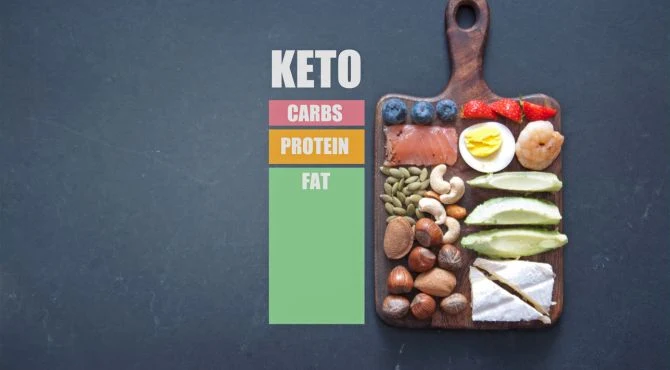Unlocking the Power of Low-Carb and Ketogenic Diets: 10 Proven Health Benefits

For decades, low-carb diets have been at the center of a nutritional controversy. Critics have argued that these diets, rich in fat, could increase cholesterol levels and elevate the risk of heart disease. However, a growing body of scientific evidence suggests that low-carb and ketogenic diets offer numerous health benefits. In this article, we will explore ten proven advantages of these diets based on an article titled "10 Health Benefits of Low-Carb and Ketogenic Diets."
Keto Diet Health Benefits

The keto diet is more than just a weight loss trend; it represents a transformative lifestyle with a multitude of health benefits. From weight management to improved cognitive function and regulated blood sugar levels, the advantages of the keto diet are supported by a growing body of scientific research. However, it's important to approach any dietary change with careful consideration, consulting with a healthcare provider or registered dietitian for personalized guidance. Embracing the keto lifestyle can be a powerful step towards optimizing health and well-being.

In conclusion, the scientific evidence is increasingly clear: low-carb and ketogenic diets offer a wide range of health benefits. They not only improve cholesterol, blood pressure, and blood sugar but also provide effective appetite control, facilitate weight loss, and reduce the risk of heart disease. If you're looking to enhance your health and well-being, exploring one of these diets might be worth considering.
- Appetite Suppression: Anyone who has tried dieting knows that controlling hunger can be a major challenge. The relentless pangs of appetite often lead to diet failures. However, low-carb diets bring a unique advantage – they naturally reduce your appetite. Studies consistently show that when individuals reduce carbohydrate intake and increase their consumption of protein and fat, they end up consuming fewer calories. This reduction in appetite can significantly aid weight management efforts.
- Effective Weight Loss:Losing weight is a primary goal for many individuals, and low-carb diets have proven to be a simple and effective method to achieve this goal. Research demonstrates that people following low-carb diets experience faster and more substantial weight loss compared to those on low-fat diets, even when the latter group restricts calorie intake. Low-carb diets promote rapid initial weight loss by reducing excess water in the body, lowering insulin levels, and curbing hunger.
- Targeting Abdominal Fat: Not all body fat is created equal. The location of fat storage in the body can have a significant impact on overall health and disease risk. Low-carb diets are particularly effective at reducing harmful visceral fat, which accumulates around abdominal organs and is linked to inflammation and insulin resistance. By predominantly targeting abdominal fat, low-carb diets may contribute to a decreased risk of heart disease and type 2 diabetes.
- Lower Triglycerides: Elevated triglyceride levels in the bloodstream are a well-known risk factor for heart disease. High carbohydrate consumption, especially simple sugars like fructose, is a significant driver of elevated triglycerides. Low-carb diets, on the other hand, can lead to a substantial reduction in blood triglycerides. This effect can be a crucial element in reducing the risk of heart disease.
- Increased HDL Cholesterol: High-density lipoprotein (HDL) cholesterol, often referred to as "good" cholesterol, plays a protective role against heart disease. Consuming a diet high in fat, as characteristic of low-carb diets, can lead to a significant increase in HDL levels. In contrast, low-fat diets often result in only moderate increases or even decreases in HDL cholesterol. This elevation of "good" cholesterol is a positive outcome for heart health.
- Blood Sugar and Insulin Regulation: For individuals with diabetes or insulin resistance, low-carb and ketogenic diets can be exceptionally beneficial. Research demonstrates that reducing carbohydrate intake significantly lowers blood sugar and insulin levels. Some individuals with type 2 diabetes may even need to reduce their insulin dosage by half shortly after starting a low-carb diet. This approach has the potential to not only treat but possibly reverse type 2 diabetes.
- Blood Pressure Reduction: Hypertension, or high blood pressure, is a major risk factor for a variety of health conditions, including heart disease, stroke, and kidney failure. Low-carb diets have been proven effective in lowering blood pressure, reducing the risk of these diseases, and promoting overall longevity.
- Effectiveness Against Metabolic Syndrome: Metabolic syndrome is a cluster of conditions, including abdominal obesity, elevated blood pressure, high fasting blood sugar levels, high triglycerides, and low levels of "good" HDL cholesterol. These conditions significantly increase the risk of diabetes and heart disease. Remarkably, low-carb diets are effective in treating all five symptoms of metabolic syndrome, reducing the overall risk of heart disease and type 2 diabetes.
- Improved LDL Cholesterol Profile: While high levels of "bad" LDL cholesterol are associated with a higher risk of heart disease, the size of LDL particles also matters. Smaller particles are more concerning, whereas larger particles are less so. Low-carb diets tend to increase the size of LDL particles, making them less harmful, and reduce the total number of LDL particles in the bloodstream. This dual effect promotes heart health.
- Therapeutic Potential for Brain Disorders: The brain primarily utilizes glucose for energy, but it can also burn ketones, which are produced when carb intake is very low. The ketogenic diet, which is extremely low in carbohydrates, has been used for years to treat epilepsy, especially in children unresponsive to traditional medications. Recent research suggests that these diets may also hold promise in addressing other brain conditions such as Alzheimer's and Parkinson's disease.
10 Health Benefits of Low-Carb and Ketogenic Diets

Post a Comment